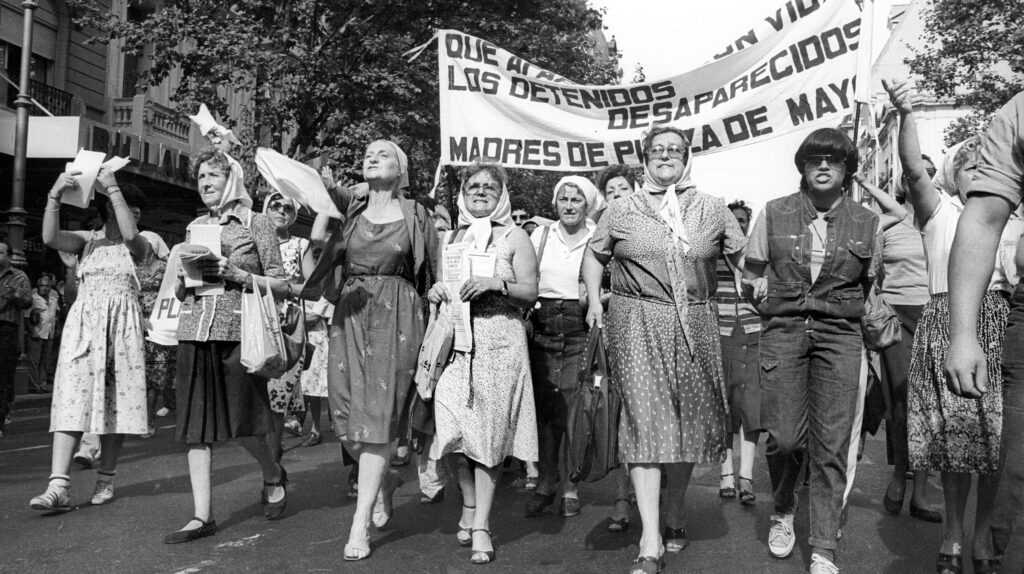by Rosa Parra
Norita is directed by Jayson McNamara and Andrea Tortonese and it follows the extraordinary story of Nora Irma Morales de Cortiñas, an Argentine human rights icon and a founding member of the Mothers of Plaza de Mayo, as she seeks justice for her son and thousands of others who disappeared under Argentina’s military dictatorship. The film delves into her relentless fight against impunity while exploring the personal toll of her activism. Through Norita’s story, the documentary highlights themes of resilience, human rights, and the enduring search for truth.
Latin American history has been a prominent part of my life; I’ve learned a whole lot more about what happened during the 1970s, in part through narrative films and documentaries. I was aware of the dictatorship that took place and the number of people who disappeared (for the most part, young activists). I was also aware of the group of women (mostly mothers of the disappeared) who came together in unison to demand answers, seek justice, and serve as a symbol of resilience. But I wasn’t aware of who the founder of this group was and the impact it’s had on society. To say Norita’s story viscerally moved me is a massive understatement.

The film opens with captions stating the following: “From the mid 1970’s Argentina’s armed forces and police detained, or forcibly disappeared an estimated 30,000 people. The mothers of the victims fought the military junta, which brutally ruled the country from 1976 to 1983. One of them was Norita Cortiñas.” The captions alone lay the groundwork for the documentary that is being brought to the table. It doesn’t shy away from depicting the brutal circumstances many victims lived through, and I appreciated the film for allowing its subject matter to explore the complexities of being imperfect mothers. Particularly Norita.
The film features animated sequences that depict some of Norita’s memories, including how she met her husband, the moments when she had her children, and notably, some intimate moments with her husband and son. These sequences add a layer of tenderness and relatability to the story. Although they represent Norita’s memories, they remind me of the film Persepolis, which tells the story of Marjane Satrapi, an Iranian woman. Both narratives evoke a sense of oppression under a dictatorship.
Throughout the film, I found myself pondering how each of these mothers found the strength and perseverance to continue fighting despite their circumstances. Losing a child is arguably the most terrifying experience a mother can endure, so their inner strength is nothing short of inspiring. I was unaware that these mothers were also victims of kidnapping, incarceration, and, in some cases, murder for voicing their demands and seeking justice.
Norita’s son, Gustavo, was kidnapped on April 15, 1977. On April 30, 1977, she went to the Plaza de Mayo to protest; this day marked the founding of the Mothers of Plaza de Mayo Movement. From that moment on, Norita vowed not to rest until she found her son and all the others who had disappeared. The movement began as a direct response to the dictatorship and has since evolved into a feminist movement, inspired by these mothers, which advocates for reproductive rights, among many other issues.

I will never forget the gruesome details shared by one of the kidnapped victims. It is unimaginable to consider what she endured upon learning she was pregnant while being tortured. I am left with a deep disdain for the inhumanity that people can inflict on one another. On a brighter note, I am filled with hope and inspiration, seeing how these mothers never stopped fighting for each other’s children and continue to advocate for women’s rights, even as they grow older.
Norita is a powerful documentary that highlights the unsung heroes of society: mothers. Their resilience in seeking justice decades after the atrocities and their influence on newer generations are remarkable. In the face of a dictatorship, these women refused to let their children be forgotten or become mere statistics. Their fight continues today, and this documentary provides a small window into their enduring legacy.
Rating: 9/10




